- News
- Reviews
- Bikes
- Accessories
- Accessories - misc
- Computer mounts
- Bags
- Bar ends
- Bike bags & cases
- Bottle cages
- Bottles
- Cameras
- Car racks
- Child seats
- Computers
- Glasses
- GPS units
- Helmets
- Lights - front
- Lights - rear
- Lights - sets
- Locks
- Mirrors
- Mudguards
- Racks
- Pumps & CO2 inflators
- Puncture kits
- Reflectives
- Smart watches
- Stands and racks
- Trailers
- Clothing
- Components
- Bar tape & grips
- Bottom brackets
- Brake & gear cables
- Brake & STI levers
- Brake pads & spares
- Brakes
- Cassettes & freewheels
- Chains
- Chainsets & chainrings
- Derailleurs - front
- Derailleurs - rear
- Forks
- Gear levers & shifters
- Groupsets
- Handlebars & extensions
- Headsets
- Hubs
- Inner tubes
- Pedals
- Quick releases & skewers
- Saddles
- Seatposts
- Stems
- Wheels
- Tyres
- Health, fitness and nutrition
- Tools and workshop
- Miscellaneous
- Cross country mountain bikes
- Tubeless valves
- Buyers Guides
- Features
- Forum
- Recommends
- Podcast
review
£3,750.00
VERDICT:
Super-slippery, pro-level time trial frameset that's stiff, lightweight and comes comes with a pro-level price tag too
Weight:
1,320g
Contact:
www.atb-sales.co.uk
At road.cc every product is thoroughly tested for as long as it takes to get a proper insight into how well it works. Our reviewers are experienced cyclists that we trust to be objective. While we strive to ensure that opinions expressed are backed up by facts, reviews are by their nature an informed opinion, not a definitive verdict. We don't intentionally try to break anything (except locks) but we do try to look for weak points in any design. The overall score is not just an average of the other scores: it reflects both a product's function and value – with value determined by how a product compares with items of similar spec, quality, and price.
What the road.cc scores meanGood scores are more common than bad, because fortunately good products are more common than bad.
- Exceptional
- Excellent
- Very Good
- Good
- Quite good
- Average
- Not so good
- Poor
- Bad
- Appalling
Whoosh! There you go. That's my review distilled into one word – the new Wilier TwinFoil is one fast bike.
Although when viewed from the side the TwinFoil looks vaguely similar to a bunch of other time trial bikes, the front end is very unusual and the frame boasts several innovative features all designed to reduce drag and maximize your speed. Even as pro-level TT bikes go, this is seriously quick.
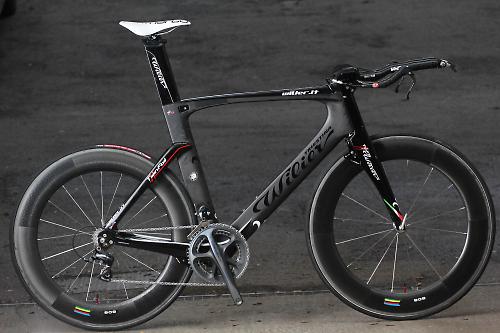
First up, though, there's that front end. What's going on there? Essentially, instead of a standard fork where the legs meet at the crown, these legs – Wilier call them 'flow stabilizers' – extend right the way up to the stem. Well, I say 'stem' but it's not a stem in the conventional sense; it's really a part of the fork.
Is this making sense? Maybe not. Okay, so you've got a headset at either end of the head tube but the fork legs keep on going upwards outside of the head tube until they join with the stem that isn't a stem. That should clear things up perfectly. Hmmm!

The flow stabilizers (the extended fork legs, remember?) sit forward of the head tube and much wider – there's a small gap between each of them and the head tube. The distance from the outside edge of one to the outside edge of the other is a whopping 68mm. That sounds like a helluva distance when common sense would say that skinnier equals faster in the world of aerodynamics. Surely, the smaller the frontal area the better, yet Wilier have made the front end super-wide.
Here's the rationale, in Wilier's own words:
'Aerodynamic design is about much more than a bike's frontal area. It's really about airflow management: developing a frame and fork capable of directing airflow through and around body parts as well as components and wheels. The most advanced aerodynamics and fluid dynamics studies have led us to measure turbulence in terms of resistance. That is why we chose to name the two airfoil elements that comprise the fork as 'flow stabilizers', each of which boasts an aerodynamic profile that diminishes air turbulence and directs passing airflow in an efficiently linear trajectory.'
Get that? Basically, the idea is to create as little turbulence as possible in order to reduce resistance and maximize speed. Simple. Kind of.

The fork legs – the lower sections – are incredibly deep, as much as 70mm from front to back, and the arms of the linear-pull brakes are effectively integrated into the back of them.
Moving backwards, the frame is made from Wilier's top-end 60 Ton carbon and the tubes have narrow but deep profiles. The rear of the seat tube is slightly cutaway to manage airflow over the rear wheel, a feature common to most TT bikes these days, but the back end is unusual. The seatstays are widely spaced like those flow stabilizers up front – again, to get them as far away as possible from the air turbulence caused by the wheel – ducking in towards the seat tube at the last minute.

The seat post follows the aero theme with its narrow/deep profile while the binder assembly is hidden within the frame so it's out of the wind. As well as being able to slide the saddle forwards and backwards along its rails in the usual way, you can alter the position of the clamp on top of the seat post by 30mm to alter the effective seat angle further.
The rear brake sits just below/behind the bottom bracket and it's shrouded in its own smooth, carbon cover while the cables run internally, the rear mech one exiting towards the end of the chainstay Di2-style. The exception is the front brake cable; that one's external.
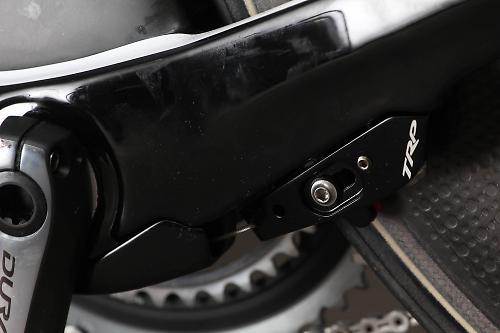
One other clever little feature that's worth mentioning is the rear dropout design. Wilier wanted vertical rather than horizontal dropouts for ease of use. The Lampre-ISD pro team use the TwinFoil in time trials and they needed a system that allows for quick wheel changes if one of the riders gets a flat out on the road, so Wilier came up with their adjustable vertical dropouts.

Each dropout is held in place by two Allen bolts and you can slide it back and forth in the frame to adjust the distance of the tyre from the seat tube. Once set, you use the dropouts as you would any other vertical dropouts, so you get the best of both worlds here.
Okay, that's plenty of tech information to be going on with. You get the picture. Wilier have been busy here developing a brand new frame that slips through the wind with minimal turbulence. And if worries about whether or not it's UCI-legal are keeping you awake at night, fear not! It has a UCI approved frame sticker and everything. You can't get any more UCI-legal than that.
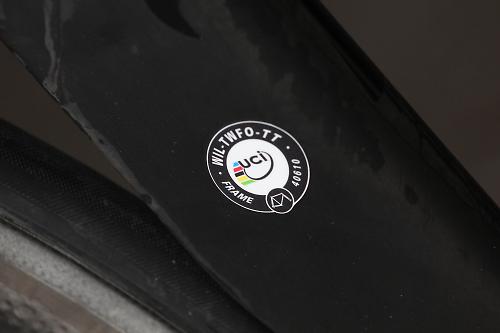
The TwinFoil comes as a frameset rather than as a complete bike: that's the frame, the fork/stem, the seat post, the brake callipers and a handlebar spacer (I'll explain that in a mo). That lot will set you back £3,750. Yup, £3,750. Look, we never said it was cheap, did we?
UK distributor ATB Sales built ours up with a Shimano Dura-Ace groupset, Vision cockpit, Zipp 808 wheels with Vittoria Corsa Evo CX tubs and a Selle San Marco saddle. If you were to want a similar build it would cost you about £9,000, making this the most expensive bike we've ever reviewed on road.cc.
I stuck some Dura-Ace pedals on too and it weighed in at 18.17lb (8.26kg), which is a bit lighter than the Trek Speed Concept 9.9 that we tested last year. Wilier claim a weight of 1,320g for the frame, although weight is hardly the main issue here.

The first hurdle is always to get the bike set up as you want it. Your own body causes far more drag than the bike itself so the slipperiest frame in the world is no good if you can't get the right body position.
There's a decent amount of adjustability here. I've already mentioned the fore/aft movement to the saddle; you also get the choice of either a 60mm or 80mm stem (which is really part of the fork system). And on top of that, you get the handlebar spacer, which is a gizmo that clamps onto the base bar to give 47mm of vertical/horizontal adjustment.
I managed to sort out a position with which I was happy. Most of my races are middle distance triathlons (1.2-mile swim, 56-mile bike, 13-mile run) and I set myself up in an aero position that allowed me to stay comfortable through the bike section of that. It's usually a compromise between comfort and speed; chances are you'll be able to play with the variables enough to get where you want to be.

Out on the road, the Twin Foil is incredibly fast. Crazy fast. It just seems to slide through the air like a wet bar of soap through your fingers. We haven't got a wind tunnel here at road.cc so I can't put a precise figure on it, but my times over regular routes say that this is a super-quick bike in the same league as the Trek Speed Concept we reviewed last year. That's anecdotal evidence, of course, and there are a million variables to take into account, but I was getting comparable times for similar levels of effort. I wasn't quite as fast as I was on the Speed Concept, but I was close enough for the difference to be explained by differences in conditions, my level of fitness and so on.
I did wonder what the handling would be like in a sidewind. What would happen when the wind caught that additional material up front? Surely, it would affect the steering. Well, if it did, it wasn't enough to be noticeable. I didn't feel I was struggling any more than usual with gusts from an angle. I mean, any deep-tubed TT bike is a bit of a handful in blowy conditions, but the TwinFoil was no worse (or better) than many others in that respect.
One thing I would say about the front end is that it's firm. With a standard fork and stem, there's quite a lot of opportunity for vertical flex. If you hit a bump, the bars can move a little to take the sting out of things. Here, you have a stem mounted directly on top of a fork steerer and two widely set flow stabilizers. When you hit a bump there really ain't much chance of it dispersing.
That means you're very reliant on comfy armrests to keep the front end comfortable. Vision's gel pads are good and the armrests – the cups they sit in – are bolted to the bars at just one end so they provide a small amount of suspension. If you think the TwinFoil is the bike for you I'd advise you to get something similar. Wilier provide a number of small adaptors that allow the use of most TT bars.

The upside to that firmness is that the steering is bang on. That's a real bonus. I found myself confident enough to stay down on the extensions through corners that would usually have me sitting up and using the base bar, and that has to be good news for shaving off the odd second here and there.
There's virtually no front-end sway when you get out of the saddle – not that you'll be getting out of the saddle all that much on a TT bike, but you're bound to from time to time. The TwinFoil is actually a very good climber. It's not up there with a lightweight road bike, obviously, but it's feathery for a deep-tubed TT bike and it doesn't feel at all sluggish when the terrain heads upwards. It's almost as stiff through the centre as it is up front too, largely thanks to a big slab of frame around the press-fit bottom bracket, so power transfer remains direct when you stand up on the pedals and give it the beans.
One final thing to mention is the manoeuvrability. The TwinFoil has the turning circle of a small bus because the flow stabilizers limit the amount you can move the bars. However, in practice, that's not an issue out on the road. When you're travelling at speed you'd never want to turn that sharply.
Verdict
Super-slippery, pro-level time trial frameset that's stiff, lightweight and comes comes with a pro-level price tag too
road.cc test report
Make and model: Wilier TwinFoil frameset
Size tested: XL
About the bike
State the frame and fork material and method of construction. List the components used to build up the bike.
It's a full carbon monocoque frame with a carbon TwinFoil fork.
The frame uses Wilier's 60 Ton carbon and their 'ultra low density nanoparticle zinc oxide resin' which is designed to give a light and strong result with high resistance to impact.
Tell us what the bike is for, and who it's aimed at. What do the manufacturers say about it? How does that compare to your own feelings about the bike?
It's a full-on race machine, simple as that.
Frame and fork
Overall rating for frame and fork
9/10
Tell us about the build quality and finish of the frame and fork?
The build quality is flawless.
Tell us about the materials used in the frame and fork?
The frame uses Wilier's 60 Ton Carbon which is Toray M60JB - very stiff stuff.
Tell us about the geometry of the frame and fork?
We had the XL size with a 57.9cm top tube, 14.9cm head tube, and 58cm seat tube (centre to top).
How was the bike in terms of height and reach? How did it compare to other bikes of the same stated size?
Pretty normal for a TT bike of this size. I found there was enough adjustability to dial in a decent position.
Riding the bike
Was the bike comfortable to ride? Tell us how you felt about the ride quality.
It was comfortable enough, by TT bike standards. The front end is certainly firm so choose your aerobar setup carefully. I'd be fitting armrests with a bit of give and gel pad.
Did the bike feel stiff in the right places? Did any part of the bike feel too stiff or too flexible?
It's very stiff both at the front end and through the centre.
How did the bike transfer power? Did it feel efficient?
This is a strength. It's very efficient.
Was there any toe-clip overlap with the front wheel? If so, was it a problem?
None.
How would you describe the steering? Was it lively, neutral or unresponsive? Lively
Tell us some more about the handling. How did the bike feel overall? Did it do particular things well or badly?
It's all about going fast in a straight line. That said, it climbs well; it's light for a TT machine.
Rate the bike for efficiency of power transfer:
9/10
Rate the bike for acceleration:
8/10
Rate the bike for sprinting:
8/10
Not really an issue.
Rate the bike for cruising speed stability:
8/10
Rate the bike for low speed stability:
8/10
Rate the bike for flat cornering:
8/10
Rate the bike for cornering on descents:
8/10
Rate the bike for climbing:
8/10
Very good by TT bike standards
The drivetrain
Wheels and tyres
Controls
Your summary
Did you enjoy riding the bike? Yes
Would you consider buying the bike? If only I had that kind of money
Would you recommend the bike to a friend? Yes
Rate the bike overall for performance:
9/10
Rate the bike overall for value:
7/10
Anything further to say about the bike in conclusion?
Judging it on value is difficult. This is a professional-standard race bike that boasts a whole load of new technology. It's never going to be cheap.
About the tester
Age: 41 Height: 190cm Weight: 75kg
I usually ride: My best bike is:
I've been riding for: Over 20 years I ride: Most days I would class myself as: Expert
I regularly do the following types of riding: time trialling, commuting, club rides, sportives, general fitness riding,
Mat has been in cycling media since 1996, on titles including BikeRadar, Total Bike, Total Mountain Bike, What Mountain Bike and Mountain Biking UK, and he has been editor of 220 Triathlon and Cycling Plus. Mat has been road.cc technical editor for over a decade, testing bikes, fettling the latest kit, and trying out the most up-to-the-minute clothing. He has won his category in Ironman UK 70.3 and finished on the podium in both marathons he has run. Mat is a Cambridge graduate who did a post-grad in magazine journalism, and he is a winner of the Cycling Media Award for Specialist Online Writer. Now over 50, he's riding road and gravel bikes most days for fun and fitness rather than training for competitions.
Latest Comments
- David9694 1 hour 40 min ago
Dawlish driver suffered seizure before smashing into wall...
- C3a 1 hour 50 min ago
I agree. Off to sign.
- themuffle 2 hours 3 min ago
With both Hunt and Scribe, I really think you'd be mad to get wheels from anybody else.
- Sriracha 2 hours 43 min ago
Weight is a problem when it costs you in energy on the uphill which is lost on the downhill, or lost in braking. But if that energy can be...
- ktache 3 hours 33 min ago
And because they are so likely to flip and are heavier they have to have stronger and wider A pillars which reduces visibility.
- MatzeLoCal 3 hours 39 min ago
What amazes me most is how small the north american market is....
- bikes 3 hours 40 min ago
"perhaps unavoidable", as gently easing off on the accelerator pedal for 2 seconds would obviously be out of the question.
- SWILD 3 hours 44 min ago
I've been commuting by bike for the last 15 years a few miles south of Hebden Bridge between Shaw and Newhey. My route follows the A640 / A663...
- Geoff Ingram 4 hours 13 min ago
While I agree that you are completely right in theory, I find that in real life roads that I can stay in a good position safely with my 36cm bars...
































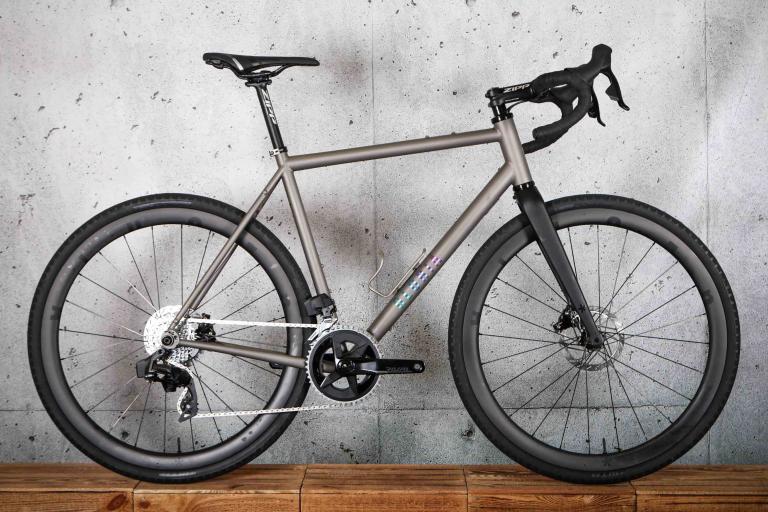
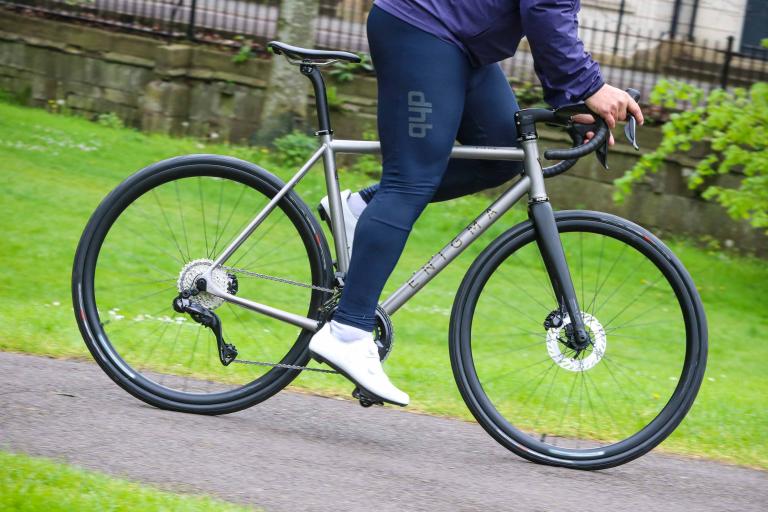
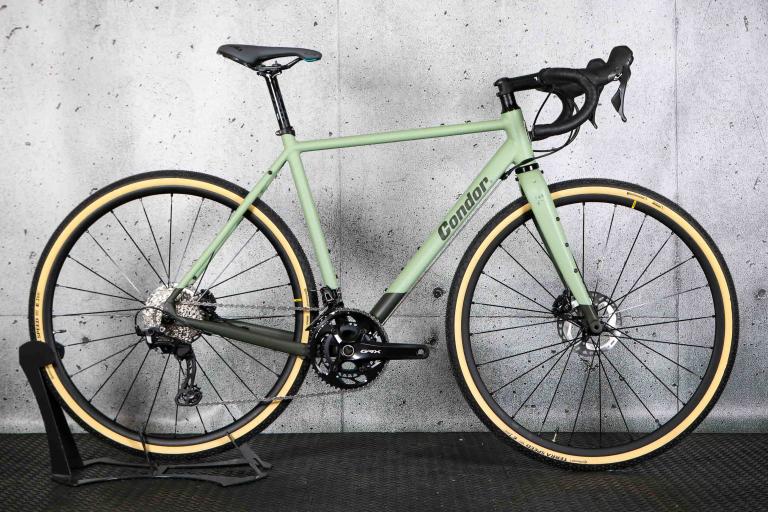
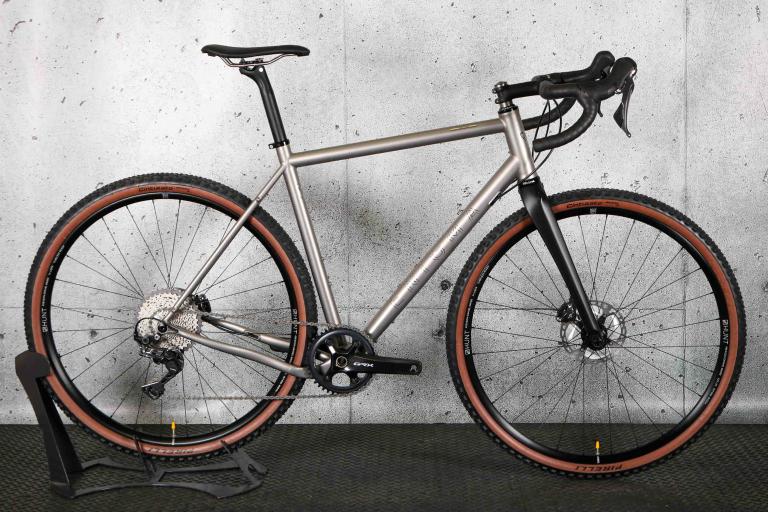
Add new comment
12 comments
http://road.cc/sites/all/modules/smileys/packs/Yahoo!/angry.gif
Nice to see linear-pull brakes on there. Just what is it about them that roadies object to?
Haven't the UCI made a rule about only having water bottles if you're going to drink more that 400, but less than 800 millilitres?
Or was that just a very ... dream.
Or an aero bottle - you must stick with the stock bidons and no mistake!
Totally agree pedalingparamedic, the line on the Bont Crono shoes stinks. Let's hope Bont prevail if/when it goes to court.
So the UCI say it's OK to have 'flow stabilisers' for £3750, but won't let you have aero shoes (http://road.cc/content/news/35273-bont-comes-out-fighting-ucis-crono-sho...)?
That'll be a different sort of air flowing over the frame to that flowing over the shoes presumably?
Madness!
shiny, wilier still as a brand dont do it for me though, however feel free to give me one for a longterm test to see if it can change my mind
Go on then, you've twisted my arm. I'll take two.
Adjustable vertical dropouts? How novel, just like the ones Gios came up with about 20 years ago on the Compact Pro.
Well, yeah, and Look and a load of other companies. But this design is, as far as I know, new to Wilier.
Ok, i've changed my underwear and taken my heart med's, time for a second look, its just pure filthy bike porn